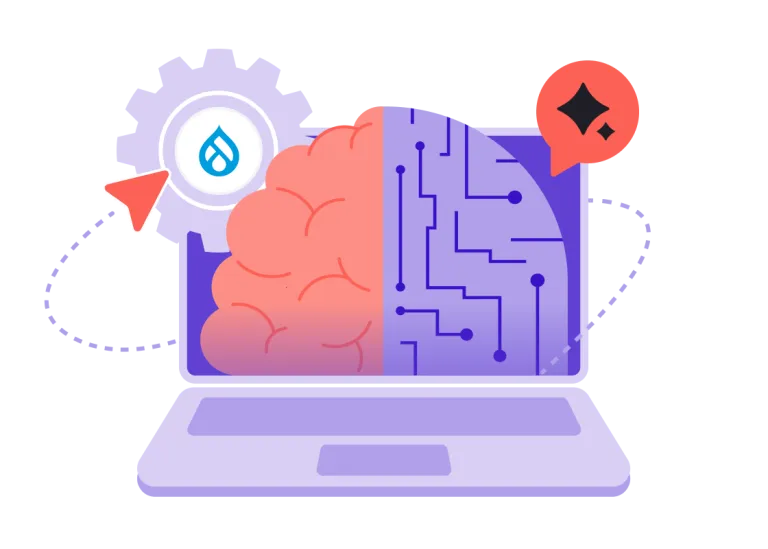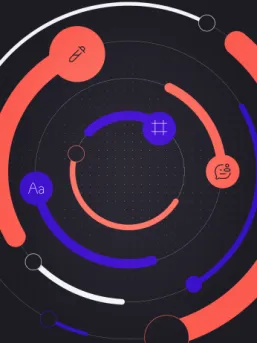Digital Transformation in the Age of AI: Why Drupal Is the Platform of Choice for What Comes Next

The term "digital transformation" has been around for over a decade, but its meaning today is significantly different from when it first entered the business vocabulary. It’s no longer just about digitising services or moving systems to the cloud. As 2026 approaches, digital transformation is about creating adaptive, intelligent platforms that can respond to change in real-time, powered by data, automation, and, increasingly, artificial intelligence.
Every organisation, regardless of sector, now faces the same challenge: how to evolve quickly enough to stay relevant in a landscape defined by constant technological acceleration. The businesses that succeed will be those that treat their digital platforms not as fixed assets, but as living systems that are capable of learning, scaling, and integrating with the next wave of emerging technologies.
AI is driving a new phase of that evolution. From content creation and translation to predictive analytics and automated service delivery, AI has rapidly evolved from a theoretical promise to a practical application. But for AI to make a real difference, to be meaningful, safe, and effective, it needs structure, context, and trustworthy data to work with. That’s where your technology foundation becomes critical.
Drupal is uniquely suited to meet this challenge. As an API-first, open-source content management framework, Drupal provides the flexible core that modern organisations need to connect systems, share data, and build scalable digital experiences. It’s not just a CMS, it’s a content engine and integration hub designed for an age of interoperability, composability, and intelligent automation.
By combining Drupal’s content modelling strength, structured data capabilities, and governed, secure workflows with emerging AI tools, organisations can build platforms that are both adaptable and future-proof. It’s a foundation that allows innovation to happen safely, where teams can experiment with AI-driven tools, automate repetitive processes, and deliver personalised experiences without compromising stability or compliance.
In short, the next era of digital transformation won’t be led by individual technologies. It will be driven by platforms that can evolve continuously. Drupal provides that foundation... a robust, open, and intelligent core ready for what comes next.
Drupal as the foundation of connected digital platforms
In a landscape where every organisation is becoming a technology organisation, the ability to connect systems, tools, and data sources has become the single most significant enabler of digital transformation. Customer experience, analytics, automation, and AI all depend on one thing: the ability to share information seamlessly and securely across your digital ecosystem.
Drupal is built for this.
At its core, Drupal is an API-first platform designed to integrate, not isolate. It acts as a central hub where content, data, and services converge. Through its powerful REST, JSON:API, GraphQL and contributed MCP capabilities, Drupal exposes structured data cleanly, allowing other applications and technologies to interact with it using industry-standard protocols.
Whether it’s connecting with a CRM, data warehouse, marketing automation platform, or AI model, Drupal provides the connective tissue that brings everything together. It can sit at the heart of your digital architecture, serving as the content engine and data orchestrator for your wider platform ecosystem.

The API-first advantage
Drupal’s API-first approach means every piece of content, every field, taxonomy, and relationship can be made accessible and machine-readable. This is what makes it such an effective foundation for composable digital experiences and intelligent automation.
When you use Drupal as the central platform layer:
- Front-end frameworks like React, Vue, and Next.js can consume content directly via APIs.
- CRM and marketing systems can sync customer data in real time.
AI tools can analyse structured content, detect patterns, and feed insights back into your platform.
Emerging technologies, ranging from conversational interfaces to generative AI, can be connected through familiar, standards-based APIs.
This interoperability, by design, makes Drupal a future-proof choice for organisations that don’t want to be locked into a single vendor or a rigid product ecosystem. Instead, it offers a secure and stable core around which innovation can flourish, where every integration strengthens the platform rather than complicates it.
Drupal and the AI-driven future
Drupal’s position as a backbone of modern digital ecosystems isn’t just about what it can do today; it’s about where it’s heading next. The global Drupal community has already embraced the AI era with remarkable energy, formalised through the Drupal AI Initiative, a major community effort to integrate artificial intelligence safely, ethically, and effectively across the platform.
Zoocha is proud to be a Gold Sponsor of the Drupal AI Initiative, providing Drupal AI services to help bring advanced AI capabilities directly into Drupal core and its surrounding ecosystem. This initiative is accelerating the development of modules and frameworks that make AI practical, from automated content generation and image tagging to intelligent search, personalisation, and accessibility analysis.
At DrupalCon Vienna 2025, Dries Buytaert’s Driesnote reaffirmed this strategic direction: a commitment to making Drupal the most intelligent, composable, and interoperable open-source digital platform in the world. His vision underscored how AI isn’t replacing Drupal’s strengths; it’s amplifying them. By combining AI with Drupal’s structured content model, open APIs, and secure governance, organisations will be able to harness intelligence within their existing platform rather than bolting it on from the outside.
The pace of innovation in Drupal’s AI module ecosystem, from AI Assistants and OpenAI integrations to workflow-enhancing chatbots, is already reshaping how digital teams work. For organisations building connected, data-rich platforms, this means they can tap into the power of AI quickly and responsibly, leveraging the same open-source collaboration that has always defined Drupal’s success.
A platform that evolves with you
Because Drupal is open source, it evolves continuously, shaped by one of the largest and most active development communities in the world. This ensures that new standards, protocols, and integrations are rapidly adopted.
For organisations undergoing digital transformation, this means less technical debt, fewer dead ends, and a platform that can grow in tandem with your business. When new technologies emerge, as AI, automation, and edge computing are doing today, Drupal can be extended rather than rebuilt.
As a result, Drupal becomes not just a CMS, but the strategic foundation of your connected digital ecosystem, a platform that powers innovation, ensures interoperability, and keeps your organisation ready for whatever’s next.
Content architecture: the hidden superpower of digital transformation
At the heart of every successful digital transformation lies one fundamental truth: you can’t automate or personalise what you can’t structure.
Drupal’s greatest strength, and often its most underestimated, is its ability to model, structure, and manage complex content relationships. Its content architecture capabilities go far beyond storing pages and posts. They enable you to define reusable entities, meaningful taxonomies, and precise relationships that provide your data with context and meaning.
This structured approach creates a single, authoritative source of truth, content that is consistent, interoperable, and instantly usable by any system that connects via Drupal’s APIs. Whether you’re powering a website, app, CRM, or data layer for AI models, Drupal ensures your information is both human-readable and machine-understandable.
By embedding schema.org structured data directly into your architecture, you make your content discoverable and semantically rich, a prerequisite for modern SEO, analytics, and especially AI-driven applications. Intelligent systems can interpret the “meaning” of your data, not just its surface text.
As we recently explored in our Building Better Drupal Websites Through Structured Content and Collaboration article, structured content doesn’t just make sites easier to manage; it transforms how teams collaborate, how quickly content can be repurposed, and how effectively it can power future experiences.
Ultimately, structured content is the foundation of digital intelligence. It ensures that when you introduce AI tools, automation, or personalisation, they’re working with meaningful, well-governed data, not chaos. Drupal makes that structure natural, intuitive, and endlessly scalable, turning content into a genuine strategic asset for transformation.
Headless and decoupled architectures: freedom to innovate
When it comes to digital transformation, agility is everything. Teams need to experiment, test, and deploy new digital experiences quickly without being held back by rigid systems or tangled dependencies. This is where Drupal’s headless and decoupled capabilities truly shine.
In Drupal, going headless isn’t a workaround; it’s a design principle. Thanks to its API-first core, exposing content to other applications via REST, JSON:API, or GraphQL is straightforward. That means your website, mobile app, kiosk, voice interface, or even an AI assistant can all draw from the same consistent, structured content layer.
This separation between back-end and front-end development allows teams to have creative freedom. Designers and developers can utilise frameworks such as React, Vue, or Next.js to build fast, dynamic user interfaces while Drupal handles content governance, security, and workflow in the background.
For organisations with complex digital estates, this approach unlocks enormous potential. New digital products can be launched faster, refreshed independently, and scaled globally without compromising performance or stability. It also makes Drupal the ideal foundation for composable architectures, where various tools and services connect through open APIs to create a seamless, coherent digital experience.
And because Drupal manages data centrally, your content remains governed and consistent, regardless of how many channels, front-ends, or experiments you spin up. That’s the real power of decoupling: the ability to innovate quickly and safely, underpinned by a stable, secure, and structured platform.
In the age of AI and automation, this flexibility gives organisations something rare: the freedom to evolve continuously, without having to start again every time technology changes.
Building the perfect platform for AI
Artificial Intelligence has moved from the edges of innovation into the centre of digital strategy. However, for AI to deliver meaningful outcomes, it requires more than just algorithms; it needs structure, context, and trustworthy data. This is where Drupal offers an unparalleled foundation.
Drupal is inherently API-first with a structured content model, it provides the clean, well-formed data that AI systems rely on to make sense of information. Its JSON:API and GraphQL endpoints expose precisely the right content in machine-readable formats, while schema.org markup and taxonomies provide the semantic context AI tools need to interpret it correctly.
That combination of rich APIs, structured data, and governance creates the ideal environment for AI to operate effectively. Whether it’s automating content tagging, personalising experiences, detecting accessibility issues, or supporting predictive analytics, Drupal ensures the data is consistent, secure, and ready for intelligent processing.
Crucially, Drupal’s architecture gives organisations a safe sandbox for innovation. With its proven security model, granular permissions, and robust workflows, teams can experiment with new AI tools, build prototypes, or integrate third-party models without compromising their core platform or user data. This flexibility enables AI innovation to flourish responsibly.
As AI continues to evolve from “vibe coding” assistants and automated content generation to intelligent moderation and service automation, Drupal provides the stable, interoperable backbone that lets those tools plug in seamlessly.
Secure, governed, and built for continuous evolution
In an era where organisations are under pressure to innovate faster, the ability to do so securely and sustainably has become a defining factor of success. Digital transformation isn’t just about speed or experimentation; it’s about building with confidence. And that confidence comes from governance, structure, and trust.
Drupal provides exactly that. Its mature governance model and security controls allow organisations to put in place guardrails over every aspect of their digital estate, from who publishes content to how integrations are approved. Every change, every update, every release can be tracked, reviewed, audited and reverted.
That’s why Drupal underpins some of the world’s most security-conscious websites, from government departments and financial regulators to global NGOs. Its open-source community works continuously to monitor, patch, and harden the platform, ensuring it remains one of the most secure CMS frameworks available. Combined with Zoocha’s own ISO 22301 (Business Continuity), ISO 27001 (Information Security), and ISO 27701 (Privacy Information Management) certifications, clients benefit from a development and hosting environment that meets the highest international standards for data protection and resilience.
Just as importantly, Drupal’s modularity and stability make it the ideal environment for continuous improvement. New AI tools, third-party systems, and front-end frameworks can be added or replaced without breaking the core platform. This gives teams the freedom to innovate, to test ideas, adopt new technologies, and evolve their customer experience, without compromising compliance, accessibility, or performance.
The result is a platform that never stands still. One that’s built not just to handle change, but to thrive on it, combining stability with agility, and governance with creativity. With Drupal at the centre, your organisation gains the freedom to transform continuously, securely, and with purpose.
Beyond technology: The human side of transformation
Digital transformation doesn’t begin with technology - it begins with people. The most advanced platforms in the world achieve little without a culture that’s willing to adapt, collaborate, and learn. That’s why, at Zoocha, we see Drupal not just as a technical foundation but as an enabler of that cultural shift.
Drupal’s open-source heritage embodies the principles that define successful transformation: transparency, collaboration, and shared progress. Every contribution, update, and security patch is the result of thousands of people worldwide working together across organisations (or indeed as individuals) to strengthen the platform. That same mindset is what organisations need internally to evolve - the belief that digital change is never “done”, and that improvement is everyone’s responsibility.
Through its structure and governance, Drupal creates an environment where content teams, developers, designers, and strategists can collaborate effectively. Its workflows and permissions systems should aim to bring clarity, not control, making it easier for teams to innovate without risk. It supports agile ways of working, continuous improvement, and shared ownership.
When transformation is powered by that combination—an open platform and an open culture—change becomes sustainable. Teams gain the confidence to experiment, the tools to collaborate, and the systems to keep progress aligned with strategic goals.
Because ultimately, technology only delivers its full potential when people are empowered to use it creatively. Drupal provides the structure; your teams provide the spark. Together, they create the conditions for lasting transformation.
Conclusion: a platform for what comes next
The next era of digital transformation will be defined by intelligence, connectivity, and adaptability. Technologies like AI, automation, and composable architectures are changing what’s possible, but success will depend on having the proper foundation to support them.
Drupal provides that foundation. It combines open-source flexibility with enterprise-grade stability, allowing organisations to connect systems, structure data, and innovate securely. Its API-first architecture makes it the perfect platform for integrating AI and emerging technologies, while its content modelling and governance tools ensure that everything remains structured, traceable, and compliant.
With Drupal at the centre of your digital ecosystem, you gain the best of both worlds: a stable, secure core for your mission-critical services, and an agile, extensible framework for continuous innovation. It’s a platform that evolves with you, one that makes experimentation safe, collaboration natural, and progress measurable.
At Zoocha, we help organisations harness that potential. Our expertise in Drupal development, strategy, and experience design, underpinned by UKAS rated ISO-certified standards in quality, security, privacy, business continuity, environmental and service management, gives clients the confidence to move forward boldly.
Because digital transformation isn’t a one-time event; it’s an ongoing practice. And in the age of AI, where change is constant and opportunities emerge daily, you need a platform built not just for today’s challenges, but for tomorrow’s possibilities.
Drupal is that platform... open, intelligent, and ready for what comes next.
About the author
David Pratt is the Chief Technology Officer at Zoocha, where he helps organisations build secure, scalable digital platforms that stand the test of time. A long time member of the Drupal community, David is passionate about open source collaboration and has contributed to Drupal’s growth through code, mentoring, and community leadership. When he’s not shaping technical strategy or exploring the next wave of digital innovation, you’ll probably find him geeking out over new ideas that make the web a better place.





